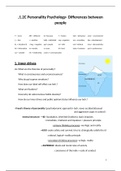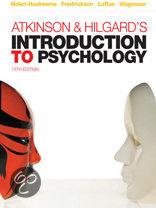,1.2C Personality Psychology- Differences between
people
↑ = more diff. = different bc =because f. = factors beh. = behaviour envir. = environment
↓ = less + = positive indiv. =individual org.= organism acc.= according dev.= development
sit. = situation/al -/neg. = negative ppl = people w/= with wo/= without char.= characteristics
inf.= information m= months y= years lvl= level betw.= between perf.= performance
var.= variable rel.= relationship comm.= communication
1. Inner drives
LG: What are the theories of personality?
What is consciousness and unconsciousness?
Why do ppl supress emotions?
How does our ideal self affect our beh.?
What are fixations?
How/why do subconscious habits develop?
How do our inner drives and public opinion/status influence our beh.?
- Freud´s theory of personality (psychodynamic approach)= beh. never accidental(sexual
and aggressive urges in control)
-mental structure: →ID: foundation, inherited (instincts), basic impulses
: immediate, irrational and impulsive = pleasure principle
: primary thinking processes- wo/logic and reality
→EGO: seeks safety and survival, tries to strategically satisfy the id
: rational, logical= reality principle
: secondary thinking processes- w/logic, reality
→SUPEREGO: ideals and moral rules of society
: conscience of the indiv.= code of conduct
1
, : introjection-incorporating values of
parents/society to obtain love and avoid
punishment
-topographical model-levels of awareness:
→conscious- thoughts, feelings, perceptions we are aware of
- monitoring and controlling ourselves/envir. to initiate/terminate beh.
and cogn. activities
- suppression= consciously trying to force feelings out of awareness
→preconscious- memories, dreams, thoughts we can access anytime
→unconscious- memories, impulses, desires, feelings, thoughts not accessible
to consciousness= repressed inf.
- repression= unconsciously making the unpleasant, painful or
disturbing emotions unavailable
-keeps unpleasant experiences out of conscious awareness
but still physiologically influences the indiv.
- when inf. is troubling/distasteful (childhood trauma, hatred) and we
are aware of them→ anxiety= warning signal primarily caused by
conflict: 1.reality anxiety- fear of the world
2. moral anxiety- fear of violating own moral code
3.neurotic anxiety- fear of impulses, no control
-motivated unconscious= nothing happens by accident, everything we
do/say/feel is an expression of mind
-reaching unconsciousness: Freudian slips (unconsciously expressed
desires), free associations (saying whatever comes to mind), projective
techniques (Rorschach´s inkblot test/ Thematic Apperception Test
(TAT)), hypnosis, dreams
-inf. can pass back and forth between conscious and preconscious, from them to
unconscious but once in unconscious→ mental gate (no access to the inf.)
-emotion= complex episode that creates a readiness to act
- we respond to/regulate them by exaggerating/minimizing
-catharsis- release of emotional tension when too big to hold up
-regulation strategies: cognitive/behavioural
2
, : diversion/engagement
-defence mechanisms= EGO sets up a respond system to deal w/issues, ↓ anxiety
denial- insist the problem is not the way it seems, refusing to accept
the truth (wife dies, still cooking dinner for her)
projection- projecting own problems on someone else (wanting to be
hostile, thinking others are also hostile)
intellectualization- thinking analytically, finding reasons, explanations
displacement- redirecting impulses to a more acceptable target (being
mad at boss but yelling at wife)
sublimation- channelling urges into socially acceptable activities (going
running when angry)
reaction formation- behaving opposite to own impulses (condemn
homosexuality but have same sex partner)
undoing- undo bad act w/another good act
regression- reacting to stress by displaying fixations from early age
isolation- detach memory from emotion
-psychosexual development- progresses/stages affecting our personality
-each stage involves a conflict→ how ppl resolve it→ rise to aspects of personality
1. oral stage (0-18m)- conflict: wearing from breast/bottle
-sources of pleasure: mouth, lips, tongue
a. oral incorporative- sucking
b. oral sadistic- biting, chewing
→smoking, drinking, nail-biting, gum-chewing
2. anal stage (18m-3y)- conflict: parents attempting toilet training w/imposed
power training/very lax training
-sources of pleasure: expelling, retaining feces through the anus
→orderliness, rigidity, obstinacy, cleanliness, dirty, sloppy, rebellion
3. phallic stage (3y-5y)- conflict: Oedipal conflict for boys (unconscious wish to
have mother to himself and eliminate the father), penis envy for girls
(wanting to have a penis), Electra complex for girls (wanting to marry
father and jealous of mother)
-sources of pleasure: genitals, touching them
→macho beh., mother-like partners, career obsessive, overly vain,
exhibitionistic, sexually aggressive, pride, flirting w/older men
3






